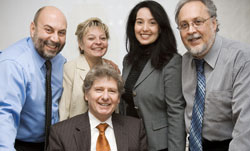Can we talk? Delivering the message

John Parisella, Special Advisor to the President on Communications, sits surrounded by Directors Sami Antaki (Marketing Communications), Chris Mota (Media Relations and Outreach), Beatrice Simone (Administration and Special Projects) and Laurie Zack (Internal and Web Communications).
Andrew Dobrowolskyj
Special Advisor on Communications John Parisella says taking a strategic approach to communications is quite different from putting a spin on the news.
“I don’t believe we should do any spinning,” he said in an interview. “We should be authentic. We are what we are. The university doesn’t operate in a vacuum, and it’s important that what we do is known. Concordia has made enormous progress in terms of its positive visibility in the media.”
Dramatic negative events at the university have been supplanted by a new visual identity, upbeat advertising, frequent good-news stories and the results of a study that show the university is highly regarded by opinion leaders, policy makers and alumni.
Closer to home, however, opinion is more nuanced. Negative views of Concordia on the part of many of its own faculty, staff and students suggest that internal communications could be improved, although Parisella thinks it’s normal for us to judge ourselves more critically.
University Communications Services moved last May from the 100-year-old Bishop Court into renovated offices on the sixth floor of the Guy Métro Building. The move has brought a new synergy to the three departments of the unit — Internal and Web Communications, Marketing Communications, and Media Relations and Outreach— and they are undertaking new projects.
The first was the new logo (see Journal, Jan. 25), which is being rolled out across the university in many ways — publications, online elements, signage, advertising and banners.
The second project is a renovation of the university’s home page and a rethinking of the university’s web presence. This is not as simple as it sounds. For one thing, it’s likely to uncover all sorts of inconsistencies and web housekeeping tasks left undone.
Initially, the goal is to give the university’s main web pages and faculty sites a more standardized look and mode of operation that leaves room for strong but integrated institutional subcultures.
Simon Horn and James Allison have piloted this project. They have been presenting it to stakeholders at the senior administrative, academic and faculty levels, as well as with directors of key service areas.
The next step will be for the university as a whole to broaden the project and see it through. The main payoff will be a positive first experience of Concordia for prospective students and professors, and a strong, consistent and user-friendly site for external visitors and the Concordia community.
The third project will be Experts Online, a virtual encyclopedia of professorial expertise on topical issues aimed primarily at the media. Tanya Churchmuch and Claire Elissalde are assembling this website. Although targeted at the media, it will provide media relations tools to faculty, staff and students as well. Experts Online will be launched along with the new university website.
Parisella is well known in Quebec as a fluently bilingual writer and broadcaster with experience in teaching, business and marketing, a strong communications background and an enviable roster of political contacts. He was chief of staff to Premier Robert Bourassa in the ’80s, and is a frequent commentator on domestic and international affairs.
When he took over communications in 2005, one of his first achievements was to establish a strategic direction based on the academic plan of the university.
Another was to give the university a strong voice in the external community in the person of Chris Mota. A third was to develop outreach by bringing appropriate events to the university.
A fourth achievement was to bring employees responsible for communications around the university into contact with one another. A group of about twenty mid-level employees from the faculties, schools and support departments meet every three weeks as the Communications Forum.
His key role, however, is probably the one described by his title: to advise President Claude Lajeunesse, frequently and directly, on a wide variety of matters. As a political commentator and a former member of Concordia’s Board of Governors, he is well placed to understand the complex nature of university governance, and the way it plays out in the public arena.